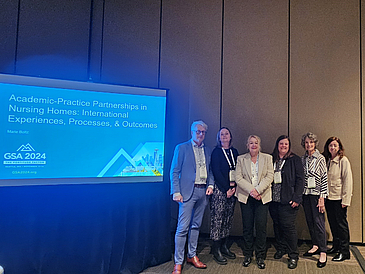As part of the Gerontological Society of America Annual Scientific Meeting 2024 (GSA 2024), Prof. Dr Karin Wolf-Ostermann from the Institute of Public Health and Nursing Research (IPP) at the University of Bremen, together with colleagues from the USA, organised a highly regarded symposium on the topic of Academic-Practice Partnerships in Nursing Homes: International Experiences, Processes, and Outcomes. She also presented the TCALL initiative as a forward-looking model for linking research, education and nursing practice from Germany.
Objectives and content of the symposium
The symposium focussed on the question of how partnership approaches between science and practice can contribute to improving the quality of long-term care. Projects from Germany, the USA and the Netherlands showed different ways in which evidence-based care concepts can be developed and successfully integrated into the everyday life of care facilities.
Focus: TCALL - transfer and innovation from Germany
The initiative presented by Prof. Dr Karin Wolf-Ostermann is at the centre of efforts to future-proof long-term care in Germany. TCALL addresses challenges such as the shortage of skilled workers, the integration of technical innovations and the further development of educational and work structures.
TCALL is currently being trialled in three care facilities in the federal state of Bremen and aims to create a sustainable infrastructure for innovation by closely interlinking research, education and practice. This model is based on international examples such as the Dutch Living Lab in Long-Term Care and the Teaching Nursing Homes in the USA.
International perspectives and findings
In addition to the German TCALL project, two other models were presented at the symposium:
- Teaching Nursing Homes (USA): This project develops practical educational programmes that prepare students specifically for the challenges of nursing practice. Qualitative findings from the experiences of the participating students were also presented.
- Living Lab in Long-Term Care (Netherlands): The focus here was on improving the quality of life of residents, the quality of care and the working conditions of care staff
Discussion and outlook
In the final discussion block, future directions were discussed, including collaboration between universities, measurement considerations and policy implications.
Conclusion
The symposium impressively demonstrated how academic-practice partnerships can deliver innovative solutions to the challenges of long-term care. TCALL in particular emphasises the importance of sustainable structures that promote the transfer of research into practice and vice versa.
The successful organisation of the symposium by Prof. Dr. Karin Wolf-Ostermann and the strong response to the content underline the relevance of such initiatives for the care of the future. Further information on GSA2024 and the projects presented can be found on the official conference website at www.gsa2024.org.


